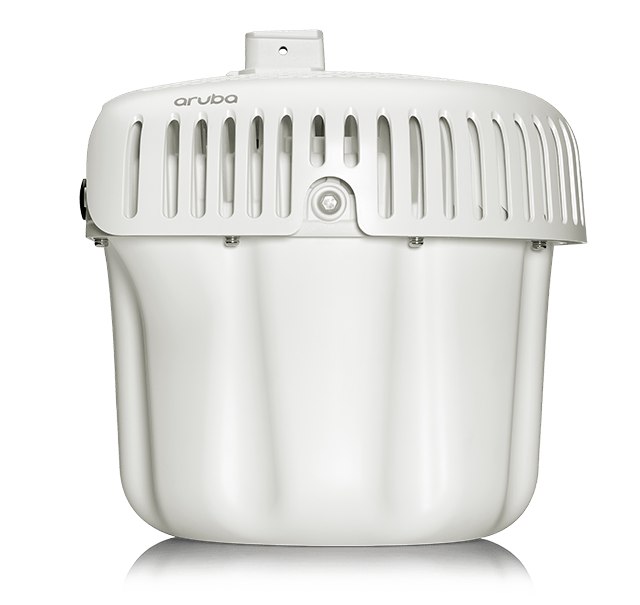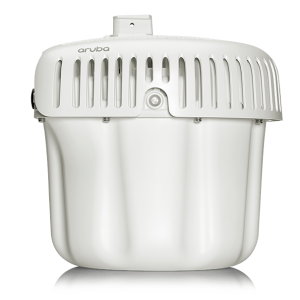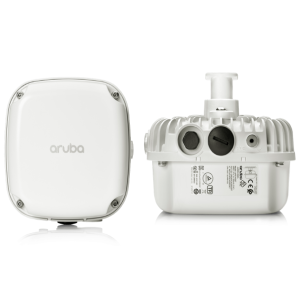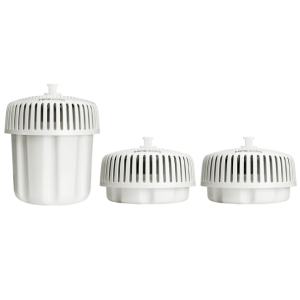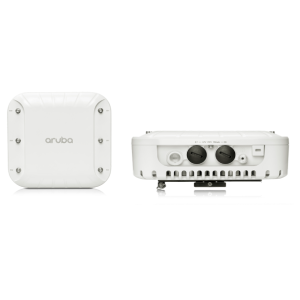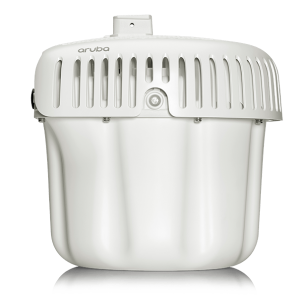| AP type: Outdoor Hardened, Wi-Fi 6 dual radio, 5GHz and 2.4GHz 802.11ax 4×4 MIMO
5GHz radio: Four spatial stream Single User (SU) MIMO for up to 2.4Gbps wireless data rate with individual 4SS HE80 (or 2SS HE160) 802.11ax client devices, or with four 1SS or two 2SS HE80 802.11ax MU-MIMO capable client devices simultaneously
2.4GHz radio: Four spatial stream Single User (SU) MIMO for up to 1,150Mbps wireless data rate with individual 4SS HE40 802.11ax client devices or with two 2SS HE40 802.11ax MU-MIMO capable client devices simultaneously
Support for up to 1,024 associated client devices per radio (typical recommended limit for active outdoor clients is 100-200 depending on distance), and up to 16 BSSIDs per radio
Supported frequency bands (country-specific restrictions apply):
-
- 2.400 to 2.4835 GHz (ISM)
- 5.150 to 5.250 GHz (U-NII-1)
- 5.250 to 5.350 GHz (U-NII-2A)
- 5.470 to 5.725 GHz (U-NII-2C)
- 5.725 to 5.850 GHz (U-NII-3/ISM)
Available channels: Dependent on configured regulatory domain
Dynamic frequency selection (DFS) optimizes the use of available RF spectrum
Supported radio technologies:
-
- 802.11b: Direct-sequence spread-spectrum (DSSS)
- 802.11a/g/n/ac: Orthogonal frequency-division multiplexing (OFDM)
- 802.11ax: Orthogonal frequency-division multiple access (OFDMA) with up to 37 resource units (for an 80MHz channel)
Supported modulation types:
-
- 802.11b: BPSK, QPSK, CCK
- 802.11a/g/n: BPSK, QPSK, 16-QAM, 64-QAM, 256-QAM (proprietary extension)
- 802.11ac: BPSK, QPSK, 16-QAM, 64-QAM, 256-QAM, 1024-QAM (proprietary extension)
- 802.11ax: BPSK, QPSK, 16-QAM, 64-QAM, 256-QAM, 1024-QAM
802.11n high-throughput (HT) support: HT20/40
802.11ac very high throughput (VHT) support: VHT20/40/80/160
802.11ax high efficiency (HE) support: HE20/40/80/160
Supported data rates (Mbps):
-
- 802.11b: 1, 2, 5.5, 11
- 802.11a/g: 6, 9, 12, 18, 24, 36, 48, 54
- 802.11n: 6.5 to 600 (MCS0 to MCS31, HT20 to HT40), 800 with 256-QAM
- 802.11ac: 6.5 to 1,733 (MCS0 to MCS9, NSS = 1 to 4, VHT20 to VHT160), 2,166 with 1024-QAM
- 802.11ax (2.4GHz): 3.6 to 1,147 (MCS0 to MCS11, NSS = 1 to 4, HE20 to HE40)
- 802.11ax (5GHz): 3.6 to 2,402 (MCS0 to MCS11, NSS = 1 to 4, HE20 to HE160)
802.11n/ac packet aggregation: A-MPDU, A-MSDU
Transmit power: Configurable in increments of 0.5 dBm
Maximum (aggregate, conducted total) transmit power (limited by local regulatory requirements):
-
- 2.4 GHz band: +29 dBm (23dBm per chain)
- 5 GHz band: +28 dBm (22 dBm per chain)
- Note: conducted transmit power levels exclude antenna gain. For total (EIRP) transmit power, add antenna gain.
Advanced Cellular Coexistence (ACC) minimizes the impact of interference from cellular networks
Maximum ratio combining (MRC) for improved receiver performance
Cyclic delay/shift diversity (CDD/CSD) for improved downlink RF performance
Space-time block coding (STBC) for increased range and improved reception
Low-density parity check (LDPC) for high-efficiency error correction and increased throughput
Transmit beam-forming (TxBF) for increased signal reliability and range
802.11ax Target Wait Time (TWT) to support low-power client devices
Advanced IoT Existence (AIC) allows for concurrent operation of the IoT and 2.4Ghz radios without issue
802.11mc Fine Timing Measurement (FTM):
-
- for precision distance ranging
|
